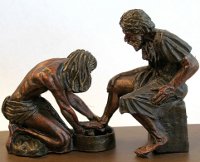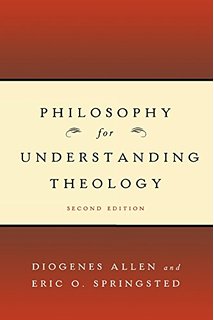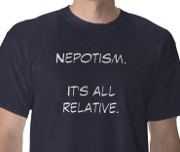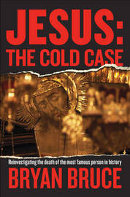 In the “Nuts and Bolts” series, I lay out some of the fundamental ideas and terms used in philosophy and theology for the lay person.
In the “Nuts and Bolts” series, I lay out some of the fundamental ideas and terms used in philosophy and theology for the lay person.
This time I’m looking at kenosis (also referred to less elegantly as kenoticism). Unfortunately, this is one of those terms which in some contexts generates more heat than light. If you search the internet for the term it’s likely that some of the first results you’ll find are extreme statements about the “heresy of kenosis.” Today I found one gem, for example, which claims that “The doctrinal heresy known as Kenoticism originated in the nineteenth century by the German theologians.”
Kenosis, however, is neither heretical nor German, and certainly did not arise in the nineteenth century, even though some nineteenth century German theologians may have formulated the idea in ways that others had not. Far from being an invention of modern Europe, kenosis has a long history in Eastern Orthodox Christianity, a significant branch of the church that many moderns are frankly ignorant of (moderns often including myself).



 Episode 42 presents the “minimal facts” approach to the resurrection of Jesus.
Episode 42 presents the “minimal facts” approach to the resurrection of Jesus. I’m a bit late in noticing this. On the fourth of May 2010, Rowan Williams, Archbishop of Canterbury, preached a sermon at Charterhouse, London (the text of that sermon is
I’m a bit late in noticing this. On the fourth of May 2010, Rowan Williams, Archbishop of Canterbury, preached a sermon at Charterhouse, London (the text of that sermon is  This week I’m in Auckland taking part in a couple of speaking events as part of
This week I’m in Auckland taking part in a couple of speaking events as part of 
 I was raised in the Roman Catholic church. Now, I’m a Protestant. I am most definitely not one of those Protestants who believes that part of apologetics means telling everyone that the Catholic church is evil. I find that flavour of Evangelicalism frankly embarrassing. The truth is that I have a great respect for the Catholic intellectual tradition, in spite of the disagreements I have with the doctrines of that church. I would gladly work with Catholics, fellowship and worship with them, and in fact I’d rather like to work at a Catholic College/University. I wanted to get that out in the open right away. I am an ecumenical Christian, and I cherish the idea that I am part of the catholic (small c, meaning worldwide or universal) Christian faith. Disagreements that I have with Catholics are disagreements among family.
I was raised in the Roman Catholic church. Now, I’m a Protestant. I am most definitely not one of those Protestants who believes that part of apologetics means telling everyone that the Catholic church is evil. I find that flavour of Evangelicalism frankly embarrassing. The truth is that I have a great respect for the Catholic intellectual tradition, in spite of the disagreements I have with the doctrines of that church. I would gladly work with Catholics, fellowship and worship with them, and in fact I’d rather like to work at a Catholic College/University. I wanted to get that out in the open right away. I am an ecumenical Christian, and I cherish the idea that I am part of the catholic (small c, meaning worldwide or universal) Christian faith. Disagreements that I have with Catholics are disagreements among family. Like a number of others tonight I have just watched
Like a number of others tonight I have just watched  A short, sweet lesson: Being a morally good person involves doing your moral duty. If you don’t at least accept that, then I think you’re basically mistaken about morality in theory (I say “in theory” because I’m comforted by the fact that you probably live as though I’m right).
A short, sweet lesson: Being a morally good person involves doing your moral duty. If you don’t at least accept that, then I think you’re basically mistaken about morality in theory (I say “in theory” because I’m comforted by the fact that you probably live as though I’m right).